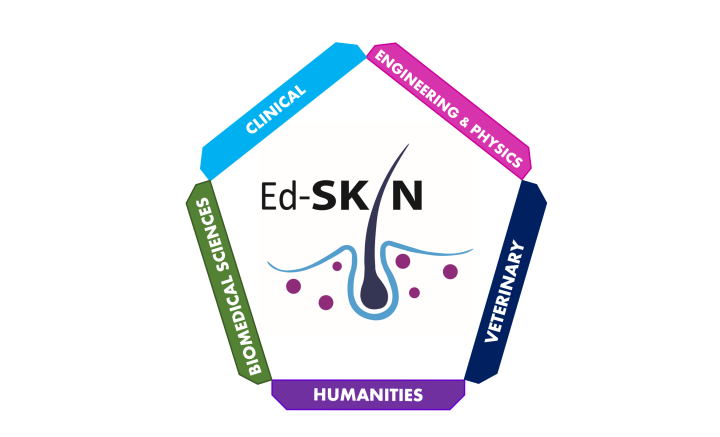About
The Edinburgh Skin Network: Bringing people together to better understand skin health, disease and personal care.
Who we are
We are a passionate, multi-disciplinary collaboration between leading biomedical scientists, dermatologists, engineers, physicists, art historians, technology and innovation specialists united by the same vision: to accelerate next generation skincare. We were founded in 2020 by Dr Jenna Cash and Dr Ross Dobie of the Centre for Inflammation Research at Edinburgh BioQuarter. Ed-SKIN brings together those interested in skin research to facilitate knowledge exchange and fruitful collaborations, particularly across disciplines. We now have over 80 members covering the University of Edinburgh Campuses of Easter Bush, Edinburgh BioQuarter, Kings Buildings, Western General, Edinburgh College of Art, Herriot Watt University and NHS Lothian.
Skin
The skin is an incredible, complex organ that comprises multiple layers and cell types that are functionally distinct. The largest of the body’s organs, our skins’ functions encompass immune surveillance, thermoregulation, sensation and water conservation. The skin is, first and foremost, however, a protective barrier against the external environment, which is composed of physical, chemical, immune and microbiome components.
The skin is also the most important determinant of human appearance and an interface for much of our physical and social interactions with our environment. Skin diseases therefore can have a profound impact on an individuals’ mental and physical well-being. Today, 1.9 billion people, almost a third of the worlds’ population, are affected by over 3,000 skin diseases. Leading culprits are eczema, wounds, psoriasis, pruritis and skin cancers.
Fostering interdisciplinary collaborations
Ed-SKIN integrates five principle disciplines to facilitate multi-disciplinary endeavours for the benefit of skin research. Our work spans basic biomedical research to unpick the complexities of skin physiology and pathology, pre-clinical models and investigative and interventional clinical trials. We develop novel therapeutic strategies and new healthcare technologies, including sensors, intelligent dressings and software which will enable more effective and efficient approaches to the diagnosis, treatment and prevention of skin diseases.
Our work is supported by a range of funders, including the Wellcome Trust, UKRI, charities, academic-industrial partnerships and non-commercial and philanthropic funders. Our current collaborations involve more than 50 HEIs and external companies/organisations worldwide.

Biomedical Science currently forms a large and diverse grouping within Ed-SKIN, engaged in skin-related research which spans several themes including wound healing, dermatitis and cancer.
Clinical which encompasses clinicians with and without current research activities and clinical trial managers. Our members are involved in international dermatology initiatives in clinical care & research.
Engineering and Physics spans Edinburgh and Heriot Watt Universities bringing together a diverse array of expertise in soft matter, biophysics, sensing and materials. This theme builds multidisciplinary collaborations centred around understanding mechanics and interfaces in skin tissue.
Humanities is currently our smallest contingent and consists of art history and public engagement.
Veterinary is predominantly represented by The Roslin Institute and the Royal (Dick) Veterinary School at the Easter Bush Campus of Edinburgh University with key research foci of canine dermatitis, equine and salmonid skin infections.
Ed-SKIN Steering Committee

Funding
We are very grateful to our funders, without whom our research would not be possible.
Scottish Research Partnership in Engineering

